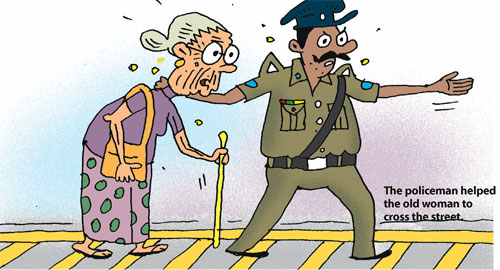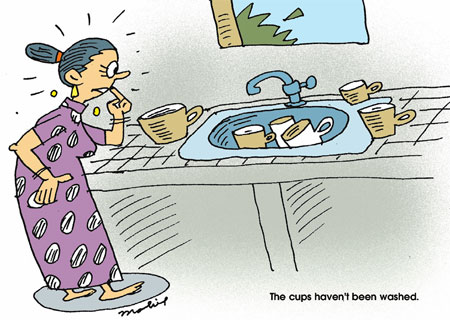|

by R. S. Karunaratne
Active and passive voice
The active and passive voice is not difficult to understand if you
learn it correctly. Let us take a sentence in the active voice.
The policeman helped the old woman to cross the street.
Here ‘the policeman’ is the subject and ‘the old woman’ is the
object. It is in the active voice because the subject does something and
it is prominent.
We can state the same facts in a different way.

The old woman was helped by the policeman to cross the street.
Here ‘the old woman’ is prominent. The sentence is in the passive voice.
Active and passive voice sentences have the same tenses.
The postman delivers letters. (Active voice)
Letters are delivered by the postman. (Passive voice)
The engineers built a bridge. (Active voice)
A bridge was built by the engineers. (Passive voice)
The lorry hit a tree. (Active voice)
A tree was hit by a lorry. (Passive voice)
Mary loves dogs. (Active voice)
Dogs are loved by Mary. (Passive voice)
The minister donated a house to a poor family. (Active voice)
A poor family was donated a house by the minister. (Passive voice)
Note how an active voice sentence in the present progressive tense is
turned into the passive voice.
Sam is building a house. (Active voice)
A house is being built by Sam (Passive voice)
The boy is eating a mango. (Active voice)
A mango is being eaten by the boy. (Passive voice)
Lal is painting the house. (Active voice)
The house is being painted by Lal. (Passive voice)
Rex is driving a car. (Active voice)
A car is being driven by Rex. (Passive voice)
Max is teaching English to poor children. (Active voice)
Poor children are taught English by Max. (Passive voice)
We drop vague pronouns in the passive voice.

Somebody saw him going to the library. (Active voice)
He was seen going to the library. (Passive voice)
People waste money during festivals. (Active voice)
Money is wasted during festivals. (Passive voice)
They are making a cake. (Active voice)
A cake is being made. (Passive voice)
They sell stamps at the counter. (Active voice)
Stamps are sold at the counter. (Passive voice.)
Note: to make the passive voice, we use ‘be verbs’ (am, is, are, was,
were) + the past participle of the verb.
A lot of paper is used in this factory.
Arabic is written from right to left.
Television programmes are watched by millions of people.
Stamps are sold at post offices.
Cricket is played by two teams.
Match words and meanings
Here’s a novel method of enriching your vocabulary. Match the words
in column ‘A’ with their meanings in column ‘B’ and check your answers
with the key. The first one has been done for you.
[Column A]
Y... 1. brewery
..... 2. brickbat
..... 3. brickwork
..... 4. bride
..... 5. bridegroom
..... 6. bridesmaid
..... 7. bridle
..... 8. brief
..... 9. briefcase
.... 10. brigade
.... 11. brigand
.... 12. bright
.... 13. brilliance
.... 14. brim
.... 15. brimful
.... 16. brine
.... 17. brisk
.... 18. brittle
.... 19. broach
.... 20. broad
.... 21. broadcast
.... 22. broaden
.... 23. broadminded
.... 24. broadsheet
.... 25. broadside
************
[Column B]
A. quick, energetic and active
B. salt water
C. full of something good
D. the bottom part of a hat
E. great talent or intelligence
F. shining
G. a thief with a weapon
H. a large group of soldiers in an army
I. a rectangular case used for carrying documents
J. lasting only a short time
K. a set of leather strips put around a horses head
L. a girl who helps the woman who is getting married
M. a man who is about to get married
N. the bricks in a wall
O. a woman who is about to get married
P. an insult
Q a strong written or spoken attack
R. a newspaper printed on large paper
S. willing to accept other people’s beliefs
T. to become wider
U. to send out a programme on television or radio
V. very wide
W. to begin a discussion of something difficult
X. delicate and easily broken
Y. a place where beer is made
***************
2. P 3. N 4. O 5. M 6. L 7. K 8. J 9. I 10. H 11. G 12. F 13. E 14. D
15. C 16. B 17. A 18. X 19. W 20. V 21. U 22. T 23. S 24. R 25. Q
***************
Starters:
Negative statements
In a negative statement ‘not’ or ‘n't’ comes after the auxiliary verb
which is a form of ‘be,’ ‘have’ or a modal verb such as ‘must, can’ or
‘could.’
The boys are not studying.
They aren't coming today.
The girls are not dancing.
The computer isn't working.

We haven't seen the new film.
You mustn't stay long.
I'm not feeling well.
You're coming with us, aren't you?
She says she can't come.
Joe hasn't got a violin.
When there is more than one auxiliary verb, we put ‘not’ or ‘n't’
after the first one.
The cups haven't been washed.
You shouldn't have resigned.
The students haven't been taught English.
We use a form of ‘do’ in the present and past simple tenses.
We do not work on Sundays.
She does not write to me regularly.
I didn't enjoy the party.
They don't teach us English properly.
‘No’ and ‘not’
We use ‘no’ before a noun or an adjective + noun. The verb is
positive.
No liquor is served in the hotel.
There are no new recruits in the company.
There aren't any new recruits in the company.
Negative questions
We make a question negative by putting ‘n't’ after the auxiliary.
[Positive]
Have you read it yet?
What does he tell you?
Who eats eggs?
What went wrong?
[Negative]
Haven't you read it yet?
What doesn't he tell you?
Who doesn't eat eggs?
What didn't go wrong?
The use of negative yes / no questions.
Haven't you applied for the post yet?
Don't they want a salary increase?
A question with ‘can't’ can be a complaint or an impolite request.
Can't you remain silent?
Can't they use their common sense?
The use of negative
WH-questions
Why don't they come early to the class?
Why don't we listen to him?
Why didn't you tell me early?
Who hasn't filled their application forms?
Why didn't the people vote for him?
Quiz on idioms
An idiom is a special kind of phrase which has a different meaning
when used together from the one it would have if the meaning of each
word were taken individually. In the following quiz tick off the meaning
you think is correct and check your answers with the key.
1. If you have the ace in your hand ...
(a) you can use it to gain an advantage
(b) you can use it to harm your opponent
(c) you can use it to withdraw money from
your bank account
2. If you hold all the aces ...
(a) you are in an awkward position
(b) you are in a weak position
(c) you are in a strong position
3. If you have a nodding acquaintance with somebody ...
(a) you know him well
(b) you know him slightly
(c) you don't know him
4. If you are performing a balancing act ...
(a) you are trying to please everybody
(b) you are trying to please one person
(c) you are trying to please no one
5. If you catch someone in the act ...
(a) you see someone doing nothing
(b) you see someone doing something right
(c) you see someone doing something wrong
6. If someone is a class act ...
(a) he is very bad at it
(b) he is very good at it
(c) he does not know what he is doing
7. If an organisation cleans up their act ...
(a) they stop behaving badly
(b) they continue to behave badly
(c) they don't listen to their critics
8. If you get your act together ...
(a) you organise a party well
(b) you begin to act well
(c) you organise your affairs more efficiently
9. I don't know him from Adam means ...
(a) I know him as Adam
(b) I don't him at all
(c) I know him well
10. When a question is left hanging in the air ...
(a) people avoid talking about it
(b) people like to talk about it
(c) nobody wants to know what it is
**********************
Key:
1. (a)
2. (c)
3. (b)
4. (a)
5. (c)
6. (b)
7. (a)
8. (c)
9. (b)
10. (a) |

